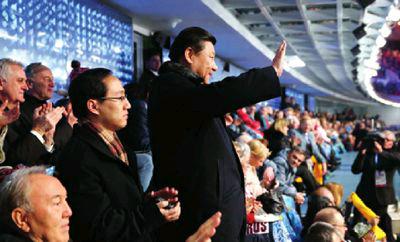Warming up The Winter
2014-03-04ByDingYing
By+Ding+Ying
The snow-covered Sochi, home to the 22nd Winter Olympic Games, was also the host of an increasingly warm relationship on display between two giant neighbors—China and Russia. During their meeting in Sochi, the presidents of the emerging powers agreed to advance bilateral relations by promoting practical economic and cultural cooperation as well as strengthening connections on global issues.
The year 2014, which marks the 65th anniversary of the establishment of their bilateral diplomatic relationship, will be an important year for enhancing the friendship between China and Russia as well as their strategic coordination in realizing their dreams of prosperity.
Olympic spirit
Chinese President Xi Jinping arrived in Sochi on February 6 to attend the opening ceremony and met with his Russian counterpart Vladimir Putin. It was their sixth meeting in the past year, in addition to three phone calls and a total of 16 letters and greetings. The increasing communication illustrates the close relationship between the two leaders and the two countries.
The Olympic Games provides a platform for sports diplomacy as well as a global athletic contest. The Sochi trip was Xis first foreign visit in 2014, as well as his first attendance at a foreign sporting event as Chinas head of state since taking office in March 2013.
“President Xis visit was not only a state head diplomatic activity, but also a public diplomatic activity, which shows his respect for Chinas giant neighbor,” said Xing Guangcheng, a researcher on Russian studies with the Chinese Academy of Social Sciences (CASS). He noted that Putin, who was Russias prime minister in 2008, also participated in the open-ing ceremony of the 2008 Beijing Summer Olympic Games.
The presidents meeting in Sochi was warm and sincere. The Chinese president said that hosting the Olympics showed Russia was on its way to prosperity under Putins leadership. Putin expressed appreciation for the Chinese president attending the opening ceremony. The Russian president said that Xis trip shortly after the Chinese Spring Festival was like reuniting with a good friend.
Li Jianmin, another researcher from the CASS, pointed out that Xis attendance showed Chinas open attitude to the world and its selfconfidence in the international community, in addition to its strong support for Russias hosting of the international sporting event.endprint
This was the first time Russia has hosted a major international sporting event since the 1980 Summer Olympic Games in Moscow. To Russia, this was not only a witness of Russias sports achievement, but also its return to a major global power on the world stage, said Li. Russia spent $51 billion in the past seven years to prepare for the games, and over 160,000 Russians applied to be volunteers.
Previously, many in the Western media called for protests of the Sochi Olympics for reasons such as Putins tough stances on global issues, Russias anti-homosexuality law and corruption in the country. Under such circumstances, President Xis attendance to the opening ceremony indicated Chinas support on important issues concerning Russia, marking the rapid development and specialness of the China-Russia relationship, Li stressed.
Mutual prosperity
Bilateral economic cooperation is warming up as well. During the meeting in Sochi, the two presidents agreed on the construction of the Silk Road Economic Belt and the Maritime Silk Road, initiatives that China first proposed in 2013.
As China is working hard to realize the Chinese dream, Russia also has a 20-year plan for the countrys prosperity and renaissance, which makes promoting bilateral economic cooperation a shared demand. Jin Canrong, Vice Dean of the School of International Relations at Renmin University of China, stressed that economic cooperation will occupy a bigger proportion of the China-Russia relationship in 2014. “They are in mutual need of one another,” said Jin, explaining that large-scale projects will be an important part of bilateral economic cooperation.
During their meeting in Sochi, Putin echoed Chinas appeal to build the Silk Road Economic Belt and the Maritime Silk Road. He expressed that Russia is willing to promote cooperation with China in the exploration of oil and natural gas, nuclear energy, space, aviation, telecommunication and cultural exchanges. The Russians believe the connection of Russias Trans-Eurasia Railway to the Silk Road Economic Belt and the Maritime Silk Road will create significant profits for both sides. Bilateral trade was $87 billion in 2013, and Russia is confident in realizing the goal of reaching a $100-billion bilateral trade volume in 2015, said Putin.
The Silk Road Economic Belt starts from China, traverses Central Asia and Russia, and ends in Europe. It could potentially be extended to North Africa. Moreover, the Maritime Silk Road, which China vows to build in collaboration with Southeast Asian nations, can guide Russian energy resources and products to bigger markets.endprint
“The abutting joint will bring cooperation on the Eurasian Continent to a new height,” said Feng Yujun, a senior research fellow with the China Institutes of Contemporary International Relations (CICIR). “It will firmly support realizing the goal of China-Russia trade reaching $200 billion in 2020.” He added that large-scale projects between the two sides in fields like crude oil, natural gas, oil pipelines, joint-venture refineries and infrastructural facilities will not only advance industrial advantages complementary of the two sides, but also will push forward regional economic cooperation.
International interaction
China and Russia have maintained active interaction on international affairs, such as the Syrian chemical weapons issue, the Korean Peninsula situation and the post-World War II order, forming an integrated point of their common interests. During their meeting in Sochi, the two presidents also exchanged ideas on promoting ties and major projects, and on regional and international issues. They also held a video conference with captains of Chinese and Russian naval vessels escorting the shipments of Syrian chemical weapons, demonstrating strong mutual trust.
Feng from the CICIR pointed out that China and Russia not only focus on coordinating and supporting each others interests, but are also making joint efforts to maintain regional and international peace and stability as the world undergoes major changes.
Xi and Putin agreed the two countries would jointly mark the 70th anniversary of the end of World War II in 2015. Since Japanese Prime Minister Shinzo Abe reassumed office in 2012, he has worked to amend the countrys pacifist Constitution, showing a clear rightward tendency. Abe visited the Yasukuni Shrine, which worships Japans war dead, including war criminals, in December 2013, causing regional tension among its neighbors—victims of Japanese militarism during World War II.
The two presidents agreement issues a clear warning to Japan. Ruan Zongze, Vice President of the China Institute of International Studies, said that as permanent members of the UN Security Council and major anti-fascist forces, China and Russia share a consensus to uphold historical facts. They have the responsibility and shared interests to safeguard the postwar order, said Ruan. In 2010, China and Russia issued a joint statement to mark the 65th anniversary of the end of the war.
Coping with Japans shift to the right has created a new area of cooperation between China and Russia, as both of them require a peaceful environment to fulfill their development goals. Feng from the CICIR said besides terrorism, Russia is also highly alert to the revival of militarism in Japan. China and Russia have a common stance on safeguarding regional peace and security, he said.
World War II ended 69 years ago. Currently, Japans national strategy is undergoing significant adjustments. Some Japanese politicians are unsatisfied with the postwar international order, and are attempting to challenge the current world order, posing a major threat to peace and security to the Asia-Pacific region and the whole world.
“China and Russia have been adhering to the stance of guarding the achievement of the international anti-fascist war and protecting the postwar order,” said Xing from the CASS. “The two presidents are reminding the world through their agreement of commemorating the victory of World War II that the historic tragedy should never be repeated.”endprint
